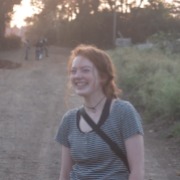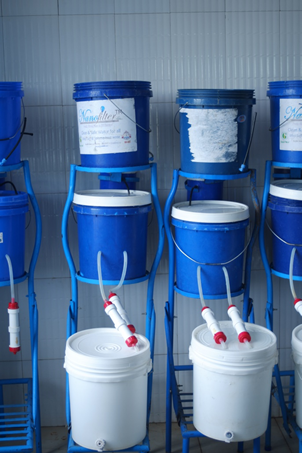
By Chrissi Albus, WEAll Youth
Clean drinking water makes a difference between life and death.
According to the United Nations, up to 2.2 billion people do not have access to safe, clean, and controlled drinking water. (2) Kofi Annan, former UN Secretary General said, “Access to safe water is a fundamental human need and, therefore, a basic human right. Contaminated water jeopardises both the physical and social health of all people. It is an affront to human dignity.”
Article 25 of the Human Rights Convention, the right to wellbeing, states that everyone has the right to a standard of living adequate for the health and wellbeing of themselves and their families. Clean drinking water is an absolute necessity for that. Therefore, one essential goal of our society must be to ensure the availability of safe drinking water for everybody. However, “in some countries, there is a 61% financing gap to achieve the UN’s water and sanitation goals”. (2) It is an injustice how access to water is distributed in this world, especially related to the huge consumption of virtual water in many high income countries. Everyone needs access to drinking water for their health and wellbeing. It should not be a game of luck who has water to drink or who can afford it. It is an undisputed part and aim of a Wellbeing Economy to ensure this. This is why it is important to advocate for fair availability of water.
Inspired and empowered to make a difference
“We believe that the human network is the strongest power in the world in our generation. Networking means telling others about others and others telling others about you”(1).
To tell a story is probably the most powerful and touching way to communicate. So, I want to tell you the story of Prof. Askwar Hilonga and the Gongali Model Inspire and Empowering Center.

“I remember my father told me that when I drink stagnant water in the valleys (in Swahili, Maji yaliyotwama korongoni au Maji ya Lambo) – which was very dirty – I should assume, he told me, that it is “a tea with milk” (chai ya maziwa)”(1), says Prof. Hilonga.
The region around Mount Meru and Kilimanjaro, where the Gongali Model Inspire and Empower Center is located, has an exceptionally high fluoride concentration in drinking water. This can cause fluorosis, a disease in which the joints stiffen and tooth enamel degrades due to excessive intake of fluoride. But even better-known diseases such as typhoid fever are still diseases today that arise because of dirty drinking water.
Prof. Hilonga grew up in a small village, Gongali, near Lake Manyara in North Tanzania. He himself struggled with several diseases, mainly related to dirty water. With the support of his local church community, he was able to attend university and later, went to South Korea to do his PhD in Chemical Engineering… He is always asking: “What does my PhD mean to my community in Tanzania?”. He wanted to give something back. Prof. Hilonga designed a new solution to ensure getting safe drinking water as a common good for everyone. He is the creator and founder of Nanofilter TM, a water filter using nanotechnology that provides safe and clean drinking water, in Swahili “Maji Safi na Salama”! It removes 99.999 % of impurities (bacteria, heavy metals, various pollutants) from the water. The filter is customised to the local environment issues.
Nevertheless, the water filter alone was not the goal. He established the Gongali Model Co. Ltd company for innovative activities to empower and IMPACT people’s lives. He wants to inspire youth to develop innovative and sustainable business ventures and initiatives that empower their community and to answer the question of what is really needed. The Gongali Model was actually designed to be a model as a movement for Sustainable Transformational Development, as a concept for a new – wellbeing – economic system accessible for everyone. By October 2020, the Nanofilter project has created 127 jobs for young women in water stations, which are placed all over Arusha as well as in Kenya and Zambia. For many young women it is a way to earn an independent income and become more confident. This is contributing to one of the great wellbeing goals of equalising the gender gap by making sure women take part in economic life. In these water stations, filtered water is sold in refillable bottles at a low price. Thus should also allow the poorest members of the community to access safe and clean drinking water.

The Gongali Model company (https://gongalimodel.com), is launching the #Thirst for life project starting on 22nd July. #Thirst for Life wants to build 1000 Nanofilter water stations throughout Africa, from Alexandria in Egypt to Cape Town, South Africa. The aim is to provide access to clean water to as many people as possible. The project is delivered in partnership with Veronique Bourbeau, who will do a Solo-Run 13,000 km, from the north of Africa to the south to raise awareness to provide safe drinking water for all people. Veronique says:
“If your why is strong enough, then you can run for a long way.”
To be inspired and empowered are two of the most important goals of Prof. Hilonga and his wife and business partner Ruth Elineema Lukwaro, from Arusha, Tanzania.He wants to engage the youth to stand up and participate in their local communities, to create new solutions for societal issues . He and his wife Madame Ruth want to touch people’s lives to make a change. Their knowledge and story exemplify a societal vision or further economic changes for wellbeing for all.
His book “The story of a journey of an African Innovator – From Gongali Village to London & BEYOND” describes his journey. Further information about the projects can be found on the Gongali Model website.
- Prof. Askwar Hilonga. 2020. “The story of a journey of an African Innovator – From Gongali Village to London & BEYOND”
- United Nations. 2020. Goals – 6. Ensure availability and sustainable management of water and sanitation for all
About the author: “My name is Chrissi Albus. I am WEAll Youth member based in Lund, a small town in the south of Sweden. In my opinion, it is very important to be motivated to create something great or to participate in a movement you believe in. And that is why I would like to tell you the story of Prof. Askwar Hilonga. He and his wife were my bosses when I worked in their company Gongali Model in Arusha. They inspired me to get engaged with their project, and showed me that motivation and inspiration is the foundation for every project I will get involved in.”
the discussion?
Let us know what
you would like
to write about!
